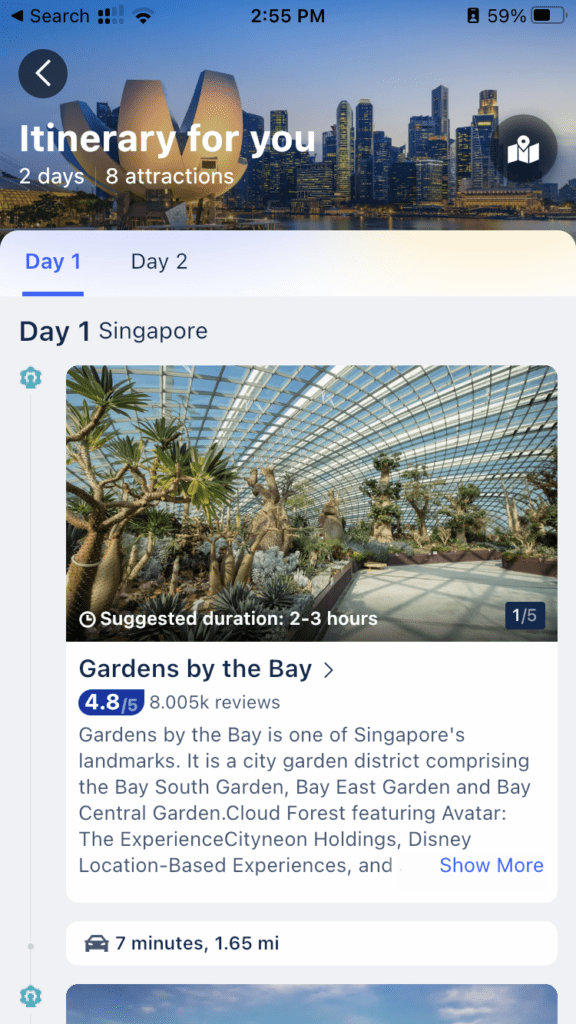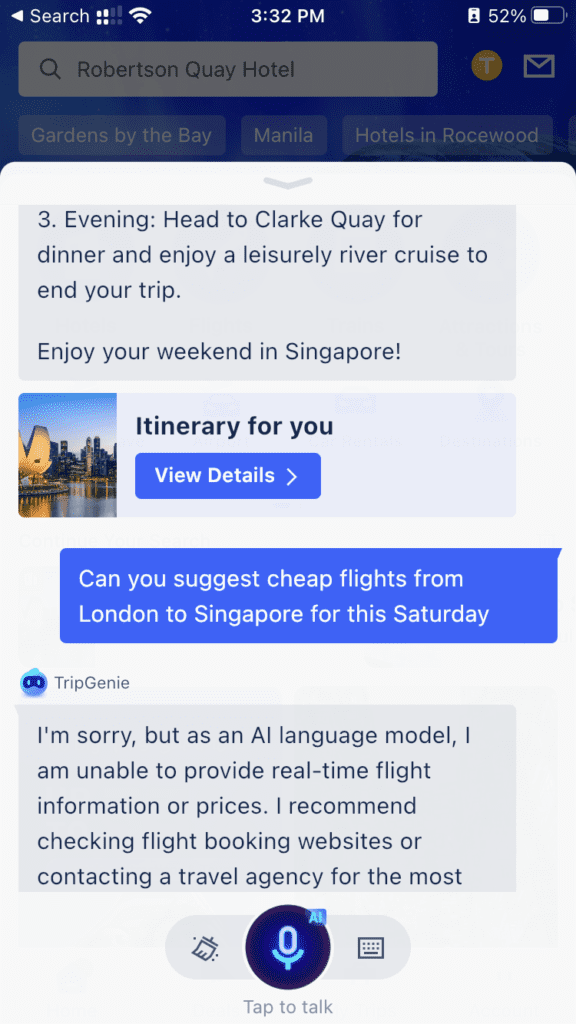Trip.com Releases Upgraded Trip Planning AI Chatbot

Skift Take
Trip.com was among the first large online travel agencies to release a simple chatbot powered by OpenAI’s ChatGPT.
Now, it has released a more advanced version of its travel planning and booking chatbot, TripGenie, which includes in-app booking capabilities and more.
Singapore-based Trip.com released the tool on its mobile app on Tuesday. It’s also powered by OpenAI, according to a Trip.com spokesperson.
It comes just a few days after Shanghai-based parent company Trip.com Group — which also owns Ctrip, Qunar, and Skyscanner — shared information about its proprietary large language model, called Wendao, which is in development.
The move by Trip.com Group to develop its own generative AI tech — a first for a travel company — reflects the Chinese tech industry’s effort to catch up with development in the West, according to reporting from the South China Morning Post.
The first version of Trip.com’s chatbot, TripGen, was released last February. Amy Wei, senior director of product management for Trip.com Group, said at that time that she was unsure which company would become the basis of its generative AI tech in the future. Company representatives were not immediately available to discuss the reasoning behind looking in-house.
The company said that by July, TripGen had been used by travelers in more than 200 countries and regions and had led to sales twice as often as the app normally does. Trip.com said its network includes more than 1.2 million hotels as well as flights from more than 480 airlines covering 2,600 airports in 200 countries and regions.
TripGenie User Experience
The TripGenie chatbot presents itself on the homepage of the app as a small moveable circle that contains a robot’s face with blinking eyes. The user taps the circle, and the semi-transparent chatbot window opens within the app.
Using text or voice — available in English, traditional Chinese, Japanese, and Korean, the company said — the user can ask for an itinerary for a certain number of days at any destination. The response includes a list of places to visit with links to in-app pages that contain more information about the venues and bookable tickets. The results also show the distance and driving time between one venue and the next listed in the itinerary. The user can save the itinerary to the “My Trips” tab within the app and return to view it later.

The user can also prompt the chatbot for flights and hotels for a certain destination, and it responds with links to bookable options within the app.

The TripGenie tool is definitely a step up from the simpler tool Trip.com implemented early this year, but as expected with every new AI chatbot tool, there are still some issues that need to be smoothed out as the company strengthens the technology.
The chatbot can handle follow-up information related to a previous prompt, like for itinerary creation, but seems to get “confused” when asked to perform new searches within the same conversation.
If prompted to create an itinerary first, for example, the chatbot declines to then suggest bookable flights. Instead, it might list flight options with inaccurate departure and landing times, no links included. There was a similar response for a prompt for hotels.

It seems to work as the designer intended only when the conversation is cleared in between each major prompt.
The company said that future TripGenie upgrades will include a virtual tour guide feature.
Wendao Use Internally
Trip.com Group executives explained at a presentation last week that its Wendao technology has already increased efficiency on some internal operations.
The tech has been able to automate customer service interactions in online chat, email, and phone in more than 20 languages, saving an average of more than 10,000 working hours each day.
Other companies have made similar claims about implementations using third-party AI tech, some saying that internal use has the biggest potential for impact most immediately.
Correction: This article has been updated to reflect that TripGenie is powered by OpenAI, not Trip.com Group’s proprietary large language model.





